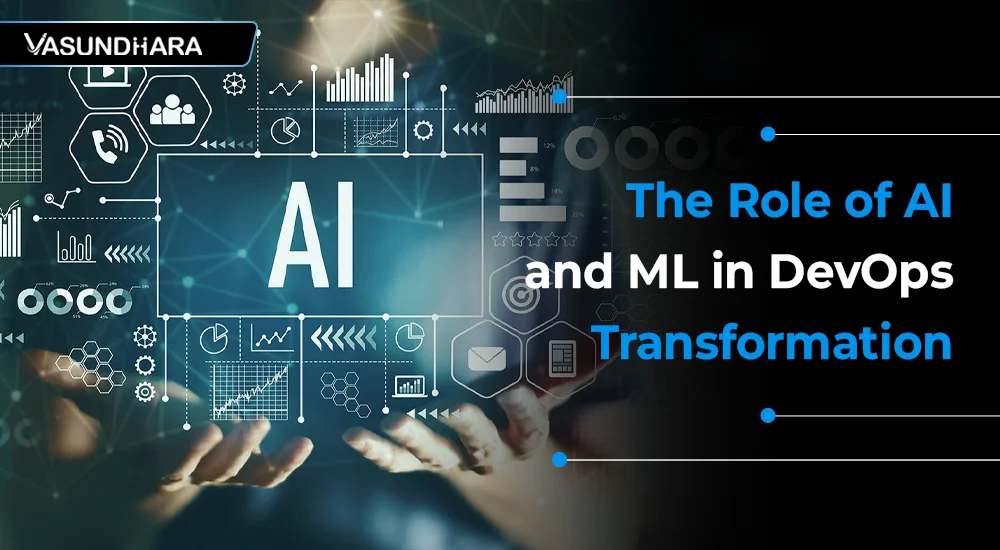The Role of AI and ML in DevOps Transformation


- Apr 17, 2024
DevOps teams are not an exception to how cutting-edge technology like ML (machine learning) and AI (artificial intelligence) is steadily changing the way we live and work. According to research, The DevOps market is projected to grow at a compound annual growth rate (CAGR) of 19.7% until 2028.
Applying artificial intelligence to DevOps and other IT operations has drastically altered our thinking. One significant effect of AI and ML on DevOps development operations is a greater emphasis on app and solution security.
DevOps comprises a collection of procedures. It incorporates the software development and information technology processes. DevOps accelerates the development, testing, and release of software. At each stage of the process, continuous feedback collection is the primary function of DevOps. DevOps fills the divide between development and operations. DevOps produces an enormous volume of data. This information is utilized for monitoring and streamlining the work process.
Certain important responsibilities generate an enormous quantity of data, which employees cannot manage. Under such circumstances, AI technology is utilized for computation and decision-making. The application of artificial intelligence accelerates production and improves accuracy. AI enables the automation of every form of business process, contributing to time savings and increased productivity. DevOps's future is contingent upon artificial intelligence.
AI, or Artificial Intelligence, refers to the simulation of human intelligence processes by machines, particularly computer systems. These processes include learning (the acquisition of information and rules for using that information), reasoning (using rules to reach approximate or definite conclusions), and self-correction.
ML, or Machine Learning, is a subset of AI that focuses on the development of algorithms and statistical models that enable computers to perform tasks without explicit instructions, relying on patterns and inference instead. ML algorithms allow systems to learn from and make predictions or decisions based on data. This field is particularly crucial for training systems to recognize patterns, make predictions, and improve their performance over time with experience, without being explicitly programmed for each task.
AI (Artificial Intelligence) encompasses the broader concept of machines performing tasks that typically require human intelligence. ML (Machine Learning) is a subset of AI, focusing on algorithms enabling machines to learn from data and make predictions or decisions without explicit programming. ML is a means to achieve AI capabilities.
Also read: What is Generative AI? Everything You Need to Know
In a data-driven environment, artificial intelligence can efficiently and effortlessly sift through the daily influx of voluminous data at a higher rate of speed to identify critical issues, thereby reducing the time-consuming and labor-intensive workload.
By integrating AI and ML, the manual configuration and automation of security aspects are optimized to minimize the likelihood of errors and misconfigured administration. Improvisation is implemented to mitigate disruptions and potential breaches caused by an attacker's exploration of vulnerabilities. With AI and ML computation, decision-making and analysis become efficient and data-supported. Several advantages of AI and ML for DevOps are as follows:
ML enables effective quality checking by creating complete test patterns based on learning from each release, improving application delivery quality.
ML integration helps DevOps create secure applications by spotting behavior patterns that prevent abnormalities in important areas such as system provisioning, automation routines, test execution, and deployment activity.
It also ensures that the most prevalent negative patterns are avoided, such as including unapproved code and stealing intellectual property in the process chain.
ML plays an important role because it can assess machine intelligence. It is critical in dealing with sudden alerts because it continuously trains the system to spot anomalies, hence aiding in the filtering of the sudden alerts process to improve its effectiveness.
With the support of AI and ML, the operations team can discover difficulties early and respond quickly, allowing for business continuity.
Furthermore, critical patterns such as configuration benchmarking are developed to satisfy performance levels and predict user behavior, keeping a constant eye on the factors that may influence customer engagement.
Also read: Low-Code vs. No-Code Development: What's the Difference?
The incorporation of AI and ML into DevOps methodologies has proven to be a revolutionary development in the domains of software development and IT operations. Not merely a futuristic notion, but also an immediate actuality, this formidable pair is revolutionizing the manner in which the institution constructs, oversees, and implements software.
Let us investigate the critical significance of AI and ML in DevOps processes.
AI in DevOps automates decision-making by analyzing data with machine learning, allowing teams to make more educated decisions, notably in release management.
For example, prior to any significant software release, an AI-driven system examines previous release data, identifies potential conflicts in code integration, and recommends a phased release approach to mitigate failure risks.
AI and ML improve the integration and continuous deployment (CI/CD) processes. When ML algorithms detect a deterioration in code quality or potential vulnerabilities, they automatically trigger extra testing or even stop the deployment process.
This proactive strategy avoids the introduction of incorrect code into the production environment.
AI is an invaluable tool in software testing. AI analyzes previous testing data to detect trends that signal crucial test cases.
For example, it identifies that particular modules are prone to defects. ML algorithms then anticipate which test cases in these modules will most likely find flaws. Testers can prioritize these situations, resulting in a more efficient testing process and improved software quality.
AI plays a critical role in incident management by recognizing and responding to concerns in real time. ML algorithms may evaluate system logs and track performance measures. When it detects an anomalous rise in resource utilization, it quickly notifies the DevOps team.
ML algorithms then examine the data to determine the fundamental reason, which may be a memory leak or an unexpected rise in user activity. This early detection and analysis reduces downtime and speeds up issue solutions.
AI-powered insights enable DevOps teams to improve resource allocation and scalability. AI examines a web application's historical usage trends and anticipates greater user traffic during specific hours. ML algorithms predict the additional server resources needed at peak hours and automatically scale the infrastructure accordingly.
This dynamic scaling ensures that resources are allocated optimally, preventing performance bottlenecks during peak demand periods.
AI and ML in DevOps improve collaboration and communication between development and operations teams. They also provide valuable insights that help identify barriers and opportunities for development in the DevOps process.
This allows teams to collaborate more effectively, resulting in higher-quality products and faster delivery. AI-powered chatbots, for example, can automate mundane communication activities, provide immediate responses to frequent questions, and improve information flow across teams.
AI and ML can bridge the gap between humans and massive amounts of high-velocity data to gain insights. So, using AI and ML, we can create a system that can assess user behavior in every way, whether it's searching, monitoring, troubleshooting, or engaging with data, and become more competent and efficient by learning from previous experiences.
Adoption of AI and ML with DevOps will result in a faster and more efficient SDLC and a secure automated process. It is a progressive step that enterprises should take to keep up with the rapid digital revolution. If a company continues to do things the old way and expects the same outcomes, the new world will not emerge. DevOps powered by AI and ML is the future, and it will become a reality soon.
I hope you liked this blog. Explore our website to read more such informative blogs. We’re a leading app development company in Surat, specializing in developing best-in-class mobile applications using the latest technology and tools. Contact us for your app development service requirements.
Copyright © 2026 Vasundhara Infotech. All Rights Reserved.
